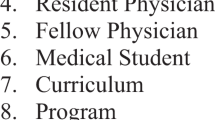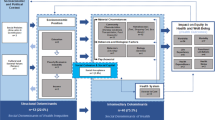Abstract
Background
Education about the prevalent chronic disease of obesity is still minimal and variable in medical school curricula. In a student-led effort with faculty support, the authors designed and implemented an obesity medicine elective at Case Western Reserve University School of Medicine (CWRU). The 10-week elective, taught by seven physicians and one dietitian, was offered in January 2023 to medical students and included: weekly lectures, an interactive session with a patient, shadowing in obesity medicine practices, attendance at a distance-learning intensive behavioral lifestyle program, student presentations, and a final written reflection. The purpose of this study was to analyze the elective reflections and identify themes about the elective’s value and areas to improve.
Methods
The authors analyzed reflections from the 20 medical students that completed the elective via qualitative thematic analysis. The analysis was performed using the Braun and Clarke six-phase framework: (1) become familiar with the data, (2) generate initial codes, (3) search for themes, (4) review themes, (5) define themes, and (6) write-up.
Results
The themes identified were improved: (1) understanding of obesity as a chronic disease, (2) knowledge about treatment options for obesity (3) confidence in compassionate obesity counseling skills, and (4) skills to confront weight bias. Theme (5) consisted of highlights (hearing from experts, practicing evidence-based medicine, and interacting with patients), and areas to improve (session length, presentation format, more peer-to-peer interaction, and more diverse patient interactions).
Conclusions
Medical student assessments of a new obesity medicine elective described improved attitudes, knowledge, and skills to address obesity and obesity bias. Students were very satisfied and contributed ideas for improvements. This elective structure and evaluation method is a feasible model to provide medical students with meaningful experiences related to obesity.
This is a preview of subscription content, access via your institution
Access options
Subscribe to this journal
Receive 12 print issues and online access
$259.00 per year
only $21.58 per issue
Buy this article
- Purchase on Springer Link
- Instant access to full article PDF
Prices may be subject to local taxes which are calculated during checkout
Similar content being viewed by others
Data availability
The data generated during and/or analyzed during the current study are available from the corresponding author on reasonable request.
References
CDC. Obesity is a Common, Serious, and Costly Disease. Centers for Disease Control and Prevention. Published May 17, 2022. Accessed July 27, 2022. https://www.cdc.gov/obesity/data/adult.html
Pearson-Stuttard J, Banerji T, Capucci S, de Laguiche E, Faurby MD, Haase CL, Sommer Matthiessen K, Near AM, Tse J, Zhao X, Evans M. Real-world costs of obesity-related complications over eight years: a US retrospective cohort study in 28,500 individuals. Int J Obes (Lond). 2023. https://doi.org/10.1038/s41366-023-01376-4
Ward ZJ, Bleich SN, Long MW, Gortmaker SL. Association of body mass index with health care expenditures in the United States by age and sex. PLOS ONE. 2021;16:e0247307. https://doi.org/10.1371/journal.pone.0247307
Butsch WS, Kushner RF, Alford S, Smolarz BG. Low priority of obesity education leads to lack of medical students’ preparedness to effectively treat patients with obesity: results from the U.S. medical school obesity education curriculum benchmark study. BMC Med Educ. 2020;20:23. https://doi.org/10.1186/s12909-020-1925-z
Wilding JPH, Batterham RL, Calanna S, Davies M, Van Gaal LF, Lingvay I, et al. Once-Weekly Semaglutide in Adults with Overweight or Obesity. N Engl J Med. 2021;384:989–1002. https://doi.org/10.1056/NEJMoa2032183
Diabetes Prevention Program STRIDES. Accessed March 1, 2023. https://www.metrohealth.org:443/population-health-innovation-institute/diabetes-prevention-program-strides
Evidence-Based Medicine Worksheets. Accessed March 30, 2023. https://www.dartmouth.edu/library/biomed/guides/research/ebm-resources-materials.html
Author information
Authors and Affiliations
Contributions
AO was responsible for designing the elective, analyzing the feedback, and drafting and editing the paper. KL, RW, SL, SB, and ES were responsible for designing the elective and editing the paper. ML and LM were responsible for analyzing the feedback and editing the paper.
Corresponding author
Ethics declarations
Competing interests
The authors declare no competing interests.
Additional information
Publisher’s note Springer Nature remains neutral with regard to jurisdictional claims in published maps and institutional affiliations.
Rights and permissions
Springer Nature or its licensor (e.g. a society or other partner) holds exclusive rights to this article under a publishing agreement with the author(s) or other rightsholder(s); author self-archiving of the accepted manuscript version of this article is solely governed by the terms of such publishing agreement and applicable law.
About this article
Cite this article
Olson, A., Lyons, K., Watowicz, R. et al. Obesity preclinical elective: a qualitative thematic analysis of student feedback. Int J Obes 48, 78–82 (2024). https://doi.org/10.1038/s41366-023-01387-1
Received:
Revised:
Accepted:
Published:
Issue Date:
DOI: https://doi.org/10.1038/s41366-023-01387-1



